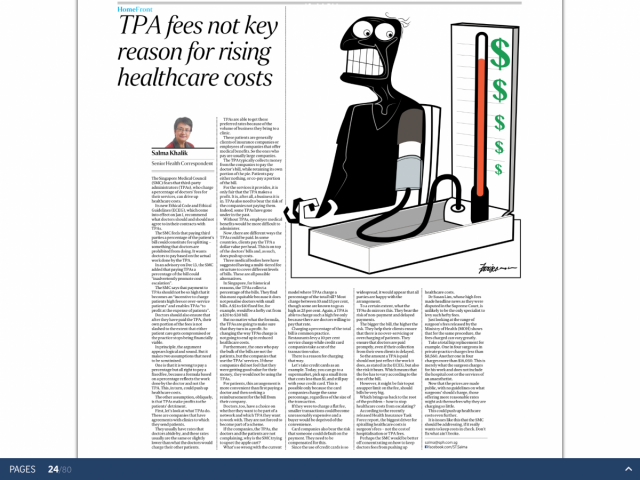Search the Community
Showing results for tags 'Rising'.
-
Weather's a b!tch nowadays so bros better take care go drink more water. From CNA: http://www.channelnewsasia.com/stories/sin...1208656/1/.html Heat stroke cases increase with rising temperatures By Kheng Leng/Alice Chia | Posted: 19 June 2012 2148 hrs
-
I think there must be a engine internal oil leakage causing oil from somewhere? in the upper parts of the engine to very slowly leak down into the sump. But what could that be ? ? ? It's an Astra-G with a Isuzu 1.7 diesel, fairly standard/simple engine I think. It does have a turbo, and a EGR valve. There's no other faults or symptoms. The Haynes? book says I should measure the oil level 10 minutes after halting, so that's what I've done, and it's half a liter above min (or half a liter below max if you like) 10 minutes after halting. But if I then come back a couple of hours later, it's aprox half a liter above max ! ? ? I'm fairly sure it was not like that before, and this is my second Astra with this engine. Before this I had oil and filter change of course. Could it be one of the oil filter gaskets ? Or a not quite compatible filter ?. Also before this, I had a too high oil level so I sucked out a little bit using a break fluid vacum pump/hose through the dip-stick (simple and easy). And at the same time before this I had an EGR-error indication, so I had the EGR out (for the second time), cleaned it, tested it, and put it back in. If that was because of too much oil or just ordinary usage I don't know. It's quite a bit of work and I had to do it a couple of years before as well, so I'm generally taking care not to have too much oil on the engine. But I don't measure the volume I pour into it. I just fill it up and check the dip-stick. ... So maybe that's how I got too much. So now, I'm using the car with maybe half a liter too much, but if I check it 10 minutes after halting, it's just perfect. There's no other faults ! ...... Power and performance is o.k. / as normal, and coolant level is steady an nice,... there's no other symptoms that I know of. The level is always the same (except as mentioned). These Y17DT engines (of which this is my second) both had oil leakage from the cam shaft sealing (and possibly some of the other seals as well), causing the register belt to be soaked in oil (but still running though), so for both I had to change the seals, and thereafter I generally didn't have any problems with the engine. Except for the Astra-G version which had a seal in the generator as well (between the vacum pump and the generator) that was of course leaking as well, and this #¤%" EGR on the Astra-G, and the ECM needing replacement on the Astra-G,... but the engine itself is, apart from this, generally quite nice. By the way, also now (and not before),... there is oil long up the dip stick after taking it out, and I have to clean it lower it and pull it up again. I don't think it was like that before. ?. ............
-
Many doctors and medical professionals here. Any thoughts? This seems to be a hot topic recently. Recently, I went through a procedure and was darn pissed with how much I had to fork out from my own pocket and according to my doctor, my company's appointed TPA is to be blamed. True?
- 26 replies
-
- healthcare
- cost
- (and 5 more)
-
Sources: http://www.straitstimes.com/singapore/transport/sales-of-diesel-cars-rising-at-fast-pace Diesel models have become the fastest-growing segment of cars, with interest fuelled by revised taxation, the carbon emission-based vehicle scheme (CEVS), lower running costs and an overall improvement in diesel technology. According to Land Transport Authority data, there are now close to 5,000 diesel-powered passenger cars on the road - up from fewer than 150 five years ago. With the quantum leap in growth, the diesel car population has now outstripped the cohort of cars that run on compressed natural gas (CNG) and is expected to overtake petrol-electric hybrids soon. There are now around 6,200 such hybrids and fewer than 2,000 CNG cars. After being largely ignored in the last several decades, diesel cars began to sway buyers in 2013 when a special tax for such vehicles was slashed for cleaner models. For Euro 5 diesel cars, the tax is 40 cents per cubic cm of engine displacement versus $1.25 for Euro 4. For those which did not meet Euro 4 emission standard, the tax was several times the vehicle's road tax. CEVS - with rebates and penalties pegged to a car's carbon emission - was also rolled out in 2013, and made more stringent this year. As diesel cars produce far less CO2 than petrol equivalents, they qualify for CEVS rebates more easily. A 130bhp power cap for Category A certificate of entitlement (COE) was also announced in 2013. As diesel cars tend to produce less power but more torque, dealers began offering more such models two years ago. And consumers have warmed up to them. Volvo agent Wearnes Automotive sold 52 diesel cars in 2013, 530 last year and 444 in the first half of this year. Peugeot agent AutoFrance said its diesel car sales doubled from 2013 to last year, and trebled from last year to this year. In fact, diesel cars now make up half of its total sales. Shipyard manager Avery Yeo, 47, said he bought a diesel Peugeot 5008 because he lives in Bedok and works in Tuas. "I clock at least 80km a day," he said. "I get 22.2km per litre with the 5008, compared to 16km for my previous car, a Toyota Wish." And since diesel is also cheaper at the pumps than petrol, Mr Yeo said "it's really worth it". The sums add up even for someone clocking a national average of 50km per day. A 1.6-litre petrol car would use around $4,000 of fuel a year, compared with $1,600 to $1,700 for a 1.6-litre diesel car. Both estimates are based on pump prices before discount. This fuel saving more than offsets the $763 premium in annual taxes the latter attracts, assuming it is a Euro 5 model. Retired pilot Leonard McCully, 71, however, was drawn to his Audi A6 Avant 3.0 TDI more for its performance. "With 650Nm of torque, it flies," he said. "In fact, when I drove it on the first day, my wife asked why I was driving so fast. "I've driven it to Phuket and it kept up with the (Porsche) 911s in the pack." Watch dealer Leslie Chang, 52, said even though his Mercedes-Benz C200 diesel attracts more than $4,000 in annual taxes (because it is Euro 4) and "is a little noisy when idling", he still enjoys it. He has done laps around Johor's Pasir Gudang race track, and the car performed well. Plus, it has a "feel- good factor" because of its low fuel consumption and carbon output. Nanyang Business School adjunct associate professor Zafar Momin said diesel cars are even gaining a foothold in the US, a predominantly petrol market. In Singapore, Mr Momin attributes diesel's meteoric rise to a host of economic reasons. But the biggest one, he said, was the power cap for Category A COE. "From a pricing standpoint, diesel models became much more attractive than the petrol versions that had been moved to Cat B," he said, adding that brands such as Volvo, Citroen, Peugeot and Renault "have clearly benefited".
-
perhaps 5-10 years ago, kia resale value is probably tagged to near hyundai, whereby people stay away from them due to the low resale value after few years. Compared to toyota and honda whose resale value sustains. However, when getting my new ride k3 from kia comparing to the new altis, I was surprised by the outstanding functions that the car offers compared to altis. Cruise control, paddle shift, rear aircon vent , sunroof, 17inch wheels where altis has none of them. And definitely i would say kia has improved tremendously over the years and i believe that its resale value will catch up to the japan brands in few years time. What do you guys say?
- 51 replies
-
PSI is hitting 321 and rising what are our million dollar ministers doing? I bet many would have taken the 1st plane out of sinkieland. In Hong Kong and other civilised countries when a Tsunami hits hazard zones the govt declares a state of emergency and orders everyone to stay in doors. Here in sinkieland even if it pours acid rain out doors our million dollar ministers will be wilfully blind and sit back and suck on their thumbs as they need the islands slave labourers to continue to toil away in the sweat shop offices. This is where a failure to act reveals the true colours of the million dollar pigs from animal farm
-
Rising property prices boost Singapore households' wealth Rising property prices have boosted Singapore's households to their wealthiest, according to a report released by the Monetary Authority of Singapore (MAS). Household wealth stood at a record high of $1.471 trillion in the three months leading up to September. This is an increase of 8.6 per cent from $1.354 trillion in the same period last year. Property made up approximately 50.2 per cent of household assets. Cash, Central Provident Fund balances, insurance and stocks and shares made up the other half. Companies and banks also showed good profits, with a strong base of funding and healthy balance sheets. However, not everything's in the pink of health for Singapore. The global economy and financial system are at their most fragile state since the global economic crisis of 2007, warned the MAS. MAS said that financial stability risks increased significantly in the second half of the year. In its annual report, it also highlighted key risks facing Singapore. These include a protracted global economic slowdown, financial contagion and pressures in the property market. A protracted global slowdown could weigh on the domestic economy, cause corporate earnings to fall, with knock-on effects on employment and wage growth, warned MAS. It also said that external shocks and financial contagion could trigger funding stresses and cause financial institutions to reprice risks. This could, in turn, lead to higher borrowing costs and curtail lending, especially in foreign currencies. While cooling measures have been implemented by the government, there is also a need to be cautious and vigilant about the property market. MAS is monitoring developments closely and stands ready to address such concerns. It said that Singapore's economy and financial system have been resilient, and that Singapore's financial sector had negligible exposures to the peripheral euro zone countries. MAS expects Singapore's economy to grow below its 3 per cent to 5 per cent potential in 2012, after expanding by about 5 per cent this year. http://business.asiaone.com/Business/News/...118-311363.html Hey all you Richie Rich! 50% of wealth in a property wor................
-
Was waiting for my mom just now when i just decided to make better use of my time and check on the water reservoir(becos i noticed the temp abit higher than normal)....and horrors of horrors!! it had very little water left... I quickly topped it up.(engine was running) Then when i started moving i noticed it shoot up to almost the red zone!!! wah..i have never seen my temp meter do a redline before!!! I then stopped moving and let it run for awhile...and the needle went down(but still higher than normal). then later on when i reached my destination and came to a full stop..it went up again for awhile before coming down... What should i do guys?
-
news say that old and new subscribers will have to pay more. who else has contract with starhub tv and feeling moody like me now? http://www.straitstimes.com/BreakingNews/S...ory_685161.html
-
Obviously I'm not from an elite school but I thought ACS is pretty elite? Why would a 10 cents increase make them feel any pinch at all? ----- Mar 22, 2011 IN THE ST NEWSPAPER TODAY Students feel pinch of rising food cost Tuckshop vendors raising prices, shrinking portions to make up for global price hike By Jessica Lim At Anglo-Chinese School (Independent), some vendors have asked for permission to raise food prices by about 10 cents. The school will grant this on a case-by-case basis, said the school's estate manager Wong Meng Kong. -- ST PHOTO: SAMUEL HE RISING global food prices have hit schools in the gut. Tuckshop vendors, stung like other food retailers by the rising cost of items like rice, oil and flour, are raising their prices, and students are feeling the pinch.
-
I have a suggestion about HDB prices. What do you guys think? Just let PRs buy new HDB flats from HDB without or much less subsidies. The main problem with the current HDB fiasco is that HDB thinks that the BTO is a good system that can react to demand easily and adjust supply accordingly. However they let out the millions of PRs who also need to buy HDB. This demand is not accounted for by HDB and it just spill over to resale and pushing up the retail prices of HDB. The resale supply is kind of fixed and the only way to increase resale supply is by pushing up the prices so you entice owners to sell their HDB. This is very bad as HDB prices will just go up and up. The day the HDB allows PRs to buy new flats, I think the HDB prices will stabilize. This solves the problem and yet allow HDB flat prices to be market priced and not artificially controlled. We still have a willing buyer willing seller market but the main difference is that the supply is much more responsive to demand changes, not just citizen but also PRs. Artificially controlling the HDB prices will have a lot of problems in creating different classes of citizens, etc.
-
terrifying http://www.msnbc.msn.com/id/33929262/ns/world_news-washington_post/ The Chinese are 'changing us' Rising global power reshapes how Americans do business, live their lives By John Pomfret updated 7:54 a.m. ET Nov. 14, 2009 WAUSAU, WIS. - In a cavernous warehouse amid rolling hills and dairy farms, a group of farmers recently gathered around a buyer in a conversation heralding a sea change in the United States. "I don't think you Americans get it," said the buyer, dressed casually in designer brands and sporting a watch worth as much as the mud-splattered GM trucks in the parking lot outside. "We need quality. We demand quality. Top quality. If you work with me, we can win together. But if you don't, there's nothing I can do." Being harangued by a pharmaceutical company executive from China was new for these burly farmers, but no one complained. These tough men from the American Midwest treated their Chinese guest as a savior of sorts, in an important economic and cultural reality that will confront President Obama on his first visit to China, starting Sunday. On visits to Shanghai and Beijing, Obama will encounter not simply a rising global power but a nation that is transforming and challenging the way Americans live overseas and at home, from college classrooms to real estate offices to the ginseng farms of central Wisconsin. Americans have been selling Panax quinquefolius to China since 1784 when the first China-bound trading ship sailed from New York to Canton, today's Guangzhou, weighed down with 30 tons of the root, prized in Asia for medicinal properties. But today the U.S. ginseng industry, centered here in Wisconsin, is on its back, kicked down by bogus imitations from Chinese competitors and state-subsidized crops from Canada. Twenty years ago, 1,500 farmers grew ginseng in Wisconsin for the China market; now the number is down to 150. Prices have dropped from $60 a pound to $24. The farmers around the ginseng barrels on this rainy fall night looked for an answer from Chun Yu, a Chinese businessman dangling his company's chain of 1,000 retail stores throughout China as the ultimate prize. "Years ago, it didn't matter what we grew. They bought everything we had," said Randy Ross, a 54-year-old former dairy farmer who has been growing ginseng since 1978. "Now we've got to learn how to satisfy them. They are changing us." Catching China fever While it's not exactly the People's Republic of Wisconsin, this state has been seized with a China fever of sorts. Throughout the United States, old notions of China have been replaced with a deeper understanding that China is a force that must be reckoned with. Hate it or love it, China is a major player in American life. China is now Wisconsin's (and the country's) third-biggest export market, buying more American soybeans, oil seeds, hides and animal skins, raw cotton, copper, nonferrous metals, wood pulp, semiconductors and miscellaneous chicken parts (a.k.a. chicken feet) than anyone else. At the University of Wisconsin, as at college campuses across the United States, mainland Chinese dominate the study of science and technology and form the backbone of the engineering, chemistry and pharmacy departments. They receive twice as many doctorates in this country as students from India, the next-closest foreign competitor. And among foreigners, they register by far the most patents in the United States. Chinese investors have snapped up pieces of distressed real estate in Milwaukee, as they have in other crumbling Midwestern industrial cities, not to mention in Florida, California and Arizona. Last year, a group from Germantown, Md., and China bought an empty mall on Milwaukee's depressed northwest side for $6 million, down from its $8 million list price. In July, a Chinese steelmaker bought 54 acres in an industrial park off Interstate 94 between Milwaukee and Chicago. A team of Midwestern businessmen, including the former CIA station chief in Beijing, has recently established, in cooperation with the Department of Homeland Security, a special zone in Wisconsin that would grant U.S. citizenship in exchange for a $1 million investment. Meanwhile, in a state that has lost more than 160,000 (or one-third) of its manufacturing jobs in a decade, local newspapers have been running editorials praising the People's Republic and blasting those who oppose closer trade ties or Chinese investment. "China is a friend to Wisconsin and its businesses, not an enemy in a trade war," the Wisconsin State Journal said in an editorial. Seeking out business Wisconsin's governor, Jim Doyle (D), has been to China to promote Wisconsin three times since he took office in 2003. When he first went, he said, fellow governors in other states worried about the appearance of an American governor going to China seeking business. Now, it's commonplace. More than 14 of his counterparts have visited China in the past two years. "China is incredibly important to us," he said in an interview. "Even in these difficult times, some of the industries getting by are the ones selling to China. If we didn't have the Chinese, we would have been in much, much tougher shape." One of those firms is Bucyrus International, based in South Milwaukee, which has exported coal-mining equipment to China since trade relations were opened in the 1970s. In the past three years, it has doubled its workforce, in part because of the China trade. "We were still skeptical seven or eight years ago that these guys were for real," said Bucyrus chief executive Tim Sullivan. "Now we know." The boosterism about China sometimes reaches a fever pitch. One of the businessmen who helped set up the special investment zone, Robert Kraft, said China in the future will do what the Germans did for Milwaukee in the past. "The Chinese are coming," Kraft said in a telephone interview from China, where he was scouting for Chinese investors. "We're just trying to get a piece of it for Wisconsin." "The Chinese Are Coming" was the title of a session in late September in Baltimore at the annual meeting of the National Association for College Admission Counseling. There educators spoke about skyrocketing numbers of Chinese high school graduates applying for admission at U.S. colleges. That's new. For the last 20 years, Chinese have been at or near the top of the number of foreign students in the United States -- but most were in grad school. In all, about 89,000 are currently in the United States, according the Chinese Embassy. China has also helped establish 61 Confucius Institutes across the United States, including one in Wisconsin, to teach Chinese and undertake "cultural dialogues," the embassy said. At the University of Wisconsin in Madison, Chinese undergraduates now account for more than half of the 1,109 Chinese students there. That increase is another sign that China is coming because Wisconsin, like many state schools, doesn't provide scholarships for international undergrads. Last year, Chinese students paid out $2 billion in tuition nationwide. "That money is keeping some American colleges alive," said Laurie Cox, who runs the international student center at the Madison campus. "Every time I turn around, another campus has signed a memorandum of understanding with another Chinese university," said Kevin Reilly, the president of the university's 26 campuses. Reilly recently joined Doyle on a trip to China. "I came away thinking, if the 20th century was the American century . . . you have to believe that the 21st century will be the Chinese century." Difficulties and disputes Wisconsin is not immune to troubles with China. For years, until they were stopped in 2004, two Chinese nationals used Milwaukee as a base from which they exported restricted electronics and computer chips to Chinese institutes that make missiles. Quality problems with China's imports have also bedeviled Wisconsin firms -- as they have American consumers who purchased deadly pet food, lead-laden toys, and defective drywall that is believed to have rendered thousands of homes in the South almost uninhabitable. One Wisconsin company, Scientific Protein Laboratories, was in the center of a supply chain making the blood-thinner heparin. Hundreds of allergic reactions to the drug, including 81 reported deaths, led to a nationwide recall that was linked to tainted raw materials from China in 2007 and 2008. These days Wisconsin is at the center of a new trade dispute with China. Appleton Coated of Kimberly was one of three paper companies to join with the United Steelworkers to file a petition with the government alleging that China was dumping certain types of paper products in the U.S. market. On Nov. 6, the U.S. International Trade Commission decided to investigate allegations of unfair subsidies. Jon Geenan, international vice president for the United Steelworkers, grew up near the Kimberly plant. He estimates that Chinese and Indonesian imports have cost the state more than 5,000 jobs in its paper mills. That means dozens of foreclosed homes and hundreds of people who are behind on their property taxes. "Even the churches say that donations are down," he said. "They are definitely challenging the way we live." In Marathon County, where the glaciated soil makes for a bitter ginseng, the way many Chinese like it, Yu, the ginseng buyer, appears content with his new role as big shot. He recently met Gov. Doyle and signed a deal to become China's exclusive importer of Wisconsin's prized root. "But only if the quality is good," he said. "The student has become the teacher!"
-
Does it mean 2nd hand prices will have chance to recover from the current parf + few K body?
-
Source: http://www.channelnewsasia.com/stories/sin.../359026/1/.html More premium bus services offered to meet rising ridership By Hoe Yeen Nie/ Imelda Saad, Channel NewsAsia | Posted: 08 July 2008 1816 hrs SINGAPORE: More premium bus services have been added with over 40 running on Singapore roads. These are more exclusive bus services that run certain routes to the city for a higher fare. Response has been encouraging. SMRT, which runs nine services, has seen a steady increase in ridership numbers. In particular, the number of paseengers on its service 530 from River Valley and service 531 from Simei to the Central Business District (CBD) area has nearly doubled since they were introduced in August 2007. This has prompted the transport operator to add another two evening service trips to service 531 to meet demand. With Monday's increase in downtown Electronic Road Pricing (ERP) rates, some drivers may be enticed to give up their cars for this mode of transport. Channel NewsAsia's reporters Hoe Yeen Nie and Imelda Saad put it to the test, travelling from central Singapore to Suntec city. Ms Hoe waited at Hume Avenue, just off Upper Bukit Timah Road, for the 7.40am premium bus service to Suntec City. Meanwhile, Ms Saad drove all the way to Suntec, starting her journey at the same time. The normal feeder bus service from Upper Bukit Timah Road takes passengers to Bukit Batok MRT station, but they will need to change trains at the Jurong East interchange to get into the CBD. The whole journey takes them over an hour and many commuters are put off by the morning crowds on the trains. Thus, many prefer the comfort and ease of the premium bus service and it is also cheaper than a taxi. Ms Saad, who was travelling by car said that traffic was smooth from Bukit Timah, along the PIE into the city, but she had to go through two gantries. Parking was also a breeze. The whole journey by car took about 30 minutes, while it took 45 minutes by the premium bus service. The cost of travelling by car from Hume Avenue to Suntec City came up to S$25.40 - S$21.40 for ten hours of parking, S$2.50 for fuel and S$1.50 for ERP charges. In comparison, taking a premium bus service costs S$6.60 on average. - CNA/vm
-
Toyota mulls hiking car prices in Japan - Nikkei Fri Jun 27, 2008 12:29am BST TOKYO, June 27 (Reuters) - Toyota Motor Corp (7203.T: Quote, Profile, Research) is considering raising the prices of passenger vehicles sold in Japan as higher steel and other raw materials costs weigh heavily on its profits, the Nikkei business daily said on Friday. Toyota, the world's largest automaker, may go so far as to raise the prices of all vehicles at once and will make a final decision as early as next month, the paper said. "We'll make a final decision after evaluating April-June sales and production costs," a top Toyota official was quoted by the Nikkei. Price increases by the industry leader will likely prompt other major automakers to follow suit, the paper said. Just a few days earlier, Nissan Motor Co (7201.T: Quote, Profile, Research) Chief Executive Carlos Ghosn said Japan's No. 3 automaker would likely lift car prices in Japan to offset a surge in the price of raw materials such as steel. [iD:nT270323] But he suggested that Nissan might wait for Toyota to raise prices first: "It's very, very difficult to move in a market without somehow the leader of the market (making a) move." (Reporting by Aiko Hayashi; Editing by Tomasz Janowski) http://uk.reuters.com/article/governmentFi...T34497420080626
-
Due to high raising petrol price and the saving method petrol efficient. Just wondering which matter will u guys choose? For those who stuck with car to break even period... 1) Petrol Pumping efficent, Its is advise to pump till full tank when the tank is half empty to minimise the air in the tank. But this way. If a car is 50 liters tank mean we will carry additonal 50kg petrol in our vehicle. and this will also consume more fuel of additional load. 2) Minimise the fuel contain in tanks. Try to maintain less than half tank when filling up in petrol station.so to offload the additional weight in the vehicle. 3) Always pump $20 for 2-3 days usage..and when the empty light blink..go pump another $20 dollar.. But this is time wasting to go petrol station 2-3 days time. Time = $$$ Which will be the most cost saving efficient??
-
Minister Mah says cutting petrol taxes not the way to cushion rising oil prices Posted: 21 June 2008 2024 hrs SINGAPORE: National Development Minister Mah Bow Tan has said the government cannot reduce petrol taxes despite the soaring oil prices. He warned against taking the subsidy route, noting that even countries like China and Malaysia have started to re-think their policies on this. Mr Mah was speaking on the sidelines of a community event on Saturday. As pump prices here continue to rise, some Singaporeans are wondering why the government is not stepping in to cushion the impact by cutting petrol taxes. The government has always maintained that petrol duty - currently about 40 cents for every litre - is meant to promote public transport and curb excessive use of cars. Mr Mah said: "If you price it wrongly, if you subsidise anything, people will tend to use it more or people will tend not to use it as efficiently as possible and that is going to raise the demand. Once you raise the demand, I think that is in turn going to cause prices to go up even higher." So instead of lowering taxes, Mr Mah said Singapore's strategy is to change habits and attitudes to cut down on energy consumption. "If you are a motorist, how do you cut down (energy consumption)? Reduce the number of trips, if possible. Car pool, if possible. Better still, take public transport," he said. Mr Mah was speaking to reporters on the sidelines of a dialogue session with Tampines residents. To help reduce energy costs at the township level, he said, the Tampines Town Council is looking at replacing all lights in common areas with energy-saving ones. The chit-chat session was instituted two years ago as a way for Mr Mah, who is the Tampines Grassroots Organisation adviser, to meet residents in a more informal and smaller setting. Hence, a lot of municipal issues were raised, one of which was the issue of safety in the light of the recent spate of molest cases in the neighbourhood. To address this, Mr Mah said the town council will seriously look into installing CCTV cameras in blind spots and secluded areas around the neighbourhood. - CNA/ir Source: http://www.channelnewsasia.com/stories/sin.../355547/1/.html
-
Civil servants to get half-month mid-year bonus, plus $100 to $300 Lower division officers will receive more SOME 60,000 civil servants will get a mid-year bonus of half-month and between $100 and $300 in July. Officers in the lower divisions - Division III and IV - will receive $250 and $300 respectively. Division I and II officers will receive $100. This is in line with the National Wages Council's (NWC) call to give more to low-wage workers to help them cope with rising cost of living. A statement from the Public Service Division on Wednesday said the July payout comes against a backdrop of Singapore's continuing economic growth, which is expected at between 4 to 6 per cent this year. The economy grew by 6.7 per cent in the first quarter, compared to 5.4 per cent in the last quarter of 2007. 'The mid-year payment with higher amounts of $250 to $300 for officers in the lower divisions has taken into consideration the National Wages Council's call to give a one-off special payment to help rank-and-file workers, particularly low wage workers, better cope with the impact of inflation this year,' said the statement. Last year, civil servants received a half-month bonus in July, and a one-off payment of $220. PSD said the Government will decide on the year-end bonus for civil servants when Singapore's economic performance in the second half of the year is clearer. The mid-year payout announcement was applauded by NTUC on Wednesday. In a statement, it said the higher quantum for lower division civil servants would encourage them to 'perform even better as it forms a larger percentage of their wages.' Said NTUC: 'We are glad the Government has also followed the National Wages Council's recommendations to use variable payments to reward workers and to grant a one-off special payment to help rank-and-file workers, particularly lower wage workers, cope with the impact of inflation.' 'This year, the higher dollar quantum for the lower wage civil servants will mean a lot more to them as it also serves to help them cope better with rising cost of living and inflationary pressures.' http://www.straitstimes.com/Latest%2BNews/...ory_241907.html
-
Was in thailand working for a year and only reluctantly returned last month. Everytime catch-up with friends topics alway include rising cost in Sg and how many Sg are suffering from rising cost from car ownership, food cost etc etc This morning took taxi to work at around 8.20pm(from AMK to Suntec) as later this evening need to fly to Vietnam, so can claim taxi fare from company. CTE was superb slow traffic. Compared to 1 year ago before I left, traffic at CTE around the same time back then was much much smoother. Traffic on CTE only become much better after PIE and thus, can conclude that many drivers are paying at least $6.50 per morning on ERP when on their way to work everyday. ($2.50 at the Toa Payoh Gantry, $4.00 at Potong Pasir gantry from 8.30 to 9am) So...are majority singaporean really suffering from the rising cost? I mean if you really cannot afford the ERP, you will either chose to leave home earlier (Believe ERP rates before 7.30am - 8am should be cheaper) or even just take public transport. For me, I take train everyday and leave my ride at home, use it only for evening or weekend since too expensvie to drive and park as office in suntec. So...either i am really poor or there's too many rich singaporean around...no wonder MIW can happily increase cost here and there. Even taxi fare these days also damn ex, my ride from AMK to Suntec cost me around 30sgd, after including surcharge and ERP. But on the road this morning also saw many taxi with passengers... Unless all like me on company account...
-
http://www.channelnewsasia.com/stories/sin.../343694/1/.html He said adjusting wages upwards to meet rising prices would only result in a "price-wage spiral" and Singaporeans should look at the bigger picture. ~~~~~~~~~~~~~~~~~~~~~~~~~~~~~~~~~~~~~~~~~~~~~~~~ [/color] His salary increase is justified.. Our salary increase must look at bigger picture..
-
SINGAPORE: The Singapore government is prepared to do more to soften the impact of rising food prices
- 22 replies
-
- Government
- prepared
- (and 6 more)
-
ST 13/4 Claims are sometimes larger than those for repairs, and they are driving premiums up Motor insurers, which have been battling the scourge of inflated repair bills for years, are now facing a new monster: injury claims arising from road accidents, and not all of them appear to be genuine. Industry players said the claims, which are sometimes many times larger than those for vehicle repairs, are costing insurers an arm and a leg in payouts and driving premiums up for motorists. One leading insurer said it received on average 300 injury claims a month last year - more than double the 140 a month it received in 2006. Another top motor insurer, Axa Insurance, said its volume this year has already exceeded last year's by up to 20 per cent, with whiplash, cuts and abrasions forming the bulk of claims. 'There is a worry about a rising trend in orchestrated injury claims,' Mr Derek Teo, president of the General Insurance Association (GIA), told The Sunday Times. 'Very often, they would pertain to whiplash, which is hard to substantiate or refute.' Last month, the GIA announced an initiative which it hopes will reduce inflated claims. From next month, motorists involved in an accident will have to inform their insurers within 24 hours. Industry sources said this was because people were less likely to lie or would have fewer opportunities to collaborate with workshops to submit inflated claims within the first 24 hours of an accident. But observers pointed out that the new plan would not address rising injury claims, which were sometimes filed days after an accident. Police statistics show that over 44,000 people were 'slightly injured' on the road between 2003 and last year. The annual figure crossed the 10,000-mark last year to hit 10,250 - 30 per cent more than in 2003 and outpacing the 16.5 per cent growth in vehicle population since then. Private investigator Louis Amalorpavanathan of GLA Claims Adjusting and Investigation Services said injury claims have shot up over the last year. He blamed lawyers. 'Most insurance companies are now encouraging direct settlement for repair claims, bypassing lawyers who used to be involved,' he said. He explained that this resulted in less business for some lawyers who specialised in accident claims, prompting them to scour for injury cases to represent. Lawyer Monoj Kumar Roy, 47, had this to say in retort: 'That's an unfair statement. Many people in the past did not know they could claim for injuries. How can lawyers drive injury claims if there are no injuries?' He added: 'Admittedly, there are odd cases of fakes. If insurers think there is no injury, they should fight the case and get it thrown out.' Another new development could affect the business of lawyers. As of last month, disputes arising from non-injury motor accident claims below $1,000 are no longer heard in court. Instead, they go straight to the Financial Industry Disputes Resolution Centre (Fidrec), an independent resolution centre set up in 2005. The Sunday Times understands the $1,000 cap may be reviewed - and possibly raised - in future. According to industry sources, the Subordinate Courts may soon make a similar move to outsource injury claim disputes to Fidrec because the number of such cases had exploded. The Subordinate Courts said a workplan rolling out soon would include changes in this area, but declined to go into details of injury claims being handled now. The move to divert non-injury accident claim disputes to Fidrec is expected to shave about 1,000 cases off the courts' workload.
-
I am thinking that the oil major has been too quick and eager to raise pump price. Since we cannot stop buying petrol, maybe a good way to protest is to not buy anything at petrol kiosks, other any petrol. No more buying of food & drinks, bread, magazine and even parking coupon at petrol kiosks if possible. Reduce car wash at petrol kiosk. Stop buying engine oil that is branded from Esso, Shell and SPC. Anything that is related to these oil major, other than petrol which we have no choice, we stop/ reduce buying. A collective action by all drivers will send a strong msg. Better than rely on CASE. What do u think? Doable?
-
they keep talking abt it... i dun see any action taken as yet..... or are they really out of idea wat to do...... http://sg.news.yahoo.com/cna/20080101/tap-...83-231650b.html i guess its another 5 year of empty promises..... where are those promises before the elections.....














